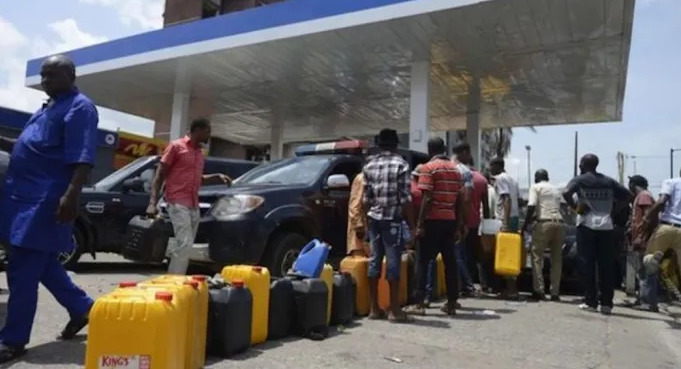With Withdrawal Of Wrong Fuel from Circulation, Queues Return To Abuja, Lagos, Others

- Petroleum marketers confirm presence of adulterated fuel in circulation
- Motorists in FCT spend hours in queues, traffic grounded
- Group wants alleged petrol hoarders arrested, prosecuted
Following the supply of a wrong specification of petrol in some parts of the country, and its subsequent removal in compliance with a government order, long queues have once more returned to petrol stations in Abuja, parts of Lagos, and some other states.
Indications emerged yesterday that the current challenge being faced in the supply of petrol in some states was as a result of the directive to withdraw adulterated products from circulation.
Flavision learnt that the shortage of supply from the sole importer, the Nigerian National Petroleum Company Limited (NNPC), had worsened the situation.
In Abuja and surrounding states, majority of filling stations were shut and motorists spent hours in the sun struggling to buy from the few that were open, and causing serious traffic jams in parts of the Federal Capital Territory (FCT).
The Independent Petroleum Marketers Association of Nigeria (IPMAN) blamed the shortage of supply on issues surrounding the presence of bad fuel in the market as well as undersupply from the national oil company.
The particular cargo with the product was said to have high sulphur, while marketers were advised not to sell to consumers, with at least 100 million litres already in circulation at the time the bad fuel was discovered.
In addition, it was learnt that the queues returned partly because the gap, which existed when depot owners started hoarding products before the announcement of retention of subsidy by the federal government, had not smoothened. This has affected the lifting of the products to, especially Abuja and other parts of the north from Lagos, Flavision gathered.
The federal government had backtracked on its plan to remove fuel subsidy in mid-2022, citing the need to protect the poor and vulnerable.
Many of the fuel stations visited, including Eterna and Enyo on Olusegun Obasanjo Way in Wuse as well as Total on Herbert Macaulay, did not have product and more than half of the fuel pumps at the NNPC mega station in the area were not operational.
South-West Zonal Chairman of the Independent Petroleum Marketers Association of Nigeria (IPMAN), Mr. Dele Tajudeen, who confirmed the existence of contaminated fuel in circulation while speaking on a national television yesterday, absolved the organisation of any blame. Tajudeen explained that that IPMAN members had suffered severe losses and may ask for damages from the authorities.
According to him, members of his group were supplied with bad products, which had put them in serious trouble, as they had to repair vehicles for their customers whose cars were impacted by the bad product.
Stressing that fuel station owners are now rejecting the bad product, he explained that the group was working to resolve the issue amicably with NNPC’s subsidiary, the Petroleum Products Marketing Company (PPMC).
We need to be compensated, but we don’t want to put the masses in another crisis if we resort to going on strike, demanding compensation because we know people are already in a deep economic problem,
he said.
The IPMAN official assured that the issue of bad fuel in circulation was already being investigated, stating that Managing Director of PPMC, Mr Isiaku Abdullahi, was intervening in the matter.
Until the investigation is concluded, I don’t want to comment more, so as not to pre-empt it, but Mr Abdullahi is making efforts to ensure that all the depots are revived. He is doing a holistic rehabilitation of the depots,
he said.
Tajudeen added,
This (fuel scarcity) is as a result of short supply from the NNPC and, of course, the private depots around Lagos. One of the major reasons for the scarcity is that the five NNPC depots in southwest as at today are not loading products.
Also, we witnessed the issue of bad product and I must use this opportunity to tell the masses that it is not from our members. As a matter of fact we suffered serious loss of cash and integrity because we received the product from the private depots.
As I am telling you, we have run into millions of naira in losses as a result of this bad product. So, the station owners are not responsible for these product.
Tajudeen commended Abdullahi for his efforts at ameliorating the situation, describing him as proactive. He said most of their customers had been complaining, prompting them to carry out repairs, replacement of the bad fuels and bearing the reputational damage caused by the situation.
He pointed out,
The situation is not too good because of non-availability of this product, coupled with this bad product that came in the last two weeks. The products are being rejected now. So, because of that, there’s shortage of product.
On the rising cost of diesel, Tajudeen stated that while the product had gone to N401 without the logistics costs, petrol has gone to N156 without transport costs, saying it will then hit N162 to N163 before it gets do the stations. “Our profit margin has been eroded completely,” he lamented.
But he argued that government could not leave pricing in private hands because it will “strangulate the masses”, adding that the international crude oil prices does not necessarily tally with the rise in prices in the country.
A top NNPC official who spoke with Flavision on the matter, stated that whatever the situation, it was the responsibility of the new downstream/midstream authority to speak on the matter.
The source said,
They (the queues) will disappear. It’s just a small supply gap. People are bound to make all sorts of speculations, but if the speculation continues, the downstream/midstream authority will come up with a statement to clarify whatever is happening.
Meanwhile, a civil advocacy group yesterday called on the federal government to take a decisive action against those alleged to be hoarding petrol in the country, and subjection unbearable hardship on the masses.
The group, in a letter to the Minister of State for Petroleum and Group Managing Director of the Nigerian National Petroleum Corporation (NNPC), specifically accused members of independent marketers of petroleum products of hoarding fuel, which according to them, was responsible for the long queues at fuel stations across the country, particularly the Federal Capital Territory (FCT) and its environs.
The letter dated February 7, 2022, and signed by the group’s Convener, Mr. Deji Adeyanju, was titled, “Persistent Hoarding of Fuel By Independent Marketers: A Call for Urgent Action.”
It said,
As you may already know, in recent months independent marketers of petroleum products have engaged in speculative acts of hoarding petroleum products, particularly PMS, in a bid to criminally increase the prices, cause artificial scarcity and plunge the country into widespread economic chaos.
For example, filing stations across the nation’s capital are littered with long queues of vehicles seeking to purchase fuel, while the independent marketers ensured that their filing stations were shut for the day by 6pm.
The group, however, lamented that the regulators had not deemed it necessary to call these independent marketers to order, as they had continued to allow them take advantage of Nigerians.
The convener expressed pain that the development was causing excruciating pain on the people, adding that an artificial fuel scarcity is the last thing they should worry about.
He stated,
It is equally important to point out that causing artificial scarcity resulting in economic sabotage is a criminal offence under our laws.
The federal government must, therefore, put a halt to the ball watching and take urgent steps to address the economic sabotage, especially as there is no reason for artificial scarcity at this time.
Sequel to the foregoing, we call on the federal government to arrest the offending marketers, shut their filling stations and bring this on-going economic sabotage to an end. Nigerians deserves to buy fuel at an accessible rate anytime.

Justin Nwosu is the founder and publisher of Flavision. His core interest is in writing unbiased news about Nigeria in particular and Africa in general. He’s a strong adherent of investigative journalism, with a bent on exposing corruption, abuse of power and societal ills.













